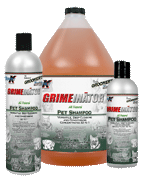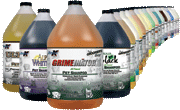| Greg Crisp, president of Double K Industries, discusses the latest trends in shampoos and conditioners and offers some practical advice on these staples of the grooming salon. |
Grooming Business: What are the latest trends in pet shampoos and conditioners?
Greg Crisp: There are a couple of primary patterns continuing simultaneously. As difficult economic conditions become the norm, groomers are increasingly focused on product effectiveness and value. While systematic cost-benefit studies of shampoo products are rare, groomers instinctively gravitate toward products they believe are financially beneficial. These products tend to be more concentrated with dilution ratios specified at up to 50 to 1. Groomers are also mindful of environmental benefits resulting from the use of more-concentrated products, including reduced waste, use of oil (plastics_ and energy used in the production of packaging. Somewhat related, the trend toward natural products persists with a substantial part of the market now occupied by this category. There are more shampoo manufacturers than ever before, and a primary challenge for groomers is to filter through the marketing claims for what is now hundreds of shampoo options and make reasonably informed purchase decisions. No laws, other than "truth in advertising" laws, regulate claims regarding dilution or concentration levels, and this has led to shampoo products with specified dilution ratios of up to 100 to 1, when virtually no functionality exists at those ratios. GB: What role do shampoos and conditioners play in addressing pets' skin problems? Crisp: There is a great and evolving selection of therapeutic shampoos and conditioners designed to address both acute and chronic skin conditions. Groomers are often the first to see these dermatological challenges, and while certainly not licensed to diagnose or treat conditions, they are frequently able to address these problems with the use of therapeutic shampoos. Oatmeal, melaleuca (tea tree oil) and tar and sulfur shampoos have been around for many years forming the foundation of this capability. New and sophisticated therapeutic blends, which may include neem oil, jojoba oil or other essential oils are now common products for groomers.
 Many times, simply bathing an animal with an exfoliating shampoo (oatmeal etc.), which cleans the skin thoroughly, will remove the source of the difficulty and the skin condition will improve. Alternately, the bactericidal and fungicidal properties in these therapeutic shampoos, in the hands of thoughtful groomers, will frequently resolve the more difficult skin conditions. Diagnosing skin conditions can be challenging for veterinary dermatologists. Certain skin conditions can be symptomatic of thyroid imbalances or other medical conditions. Care, of course, should be taken to suggest veterinary examination for animals not responding to the therapeutic shampoos. GB: Are there any particular guidelines that groomers should follow when using natural shampoos and conditioners? Crisp: Yes, while definitions of what is "natural" vary, there are a number of important issues that groomers should be attentive to while using these increasingly popular products. Most natural shampoo products have fairly low levels of natural preservatives, if any at all. Preservatives are added to shampoo formulas primarily to prevent the growth of bacteria, viruses, fungi or molds. The absence of strong preservatives increases the possibility that these biological contaminants could develop in a product and create risk for a pet or groomer.
Moist, warm grooming shops are perfect environments for biological contaminants. Care should be taken when opening or closing shampoo containers or transferring product from one container to another. A shampoo container with the lid left off, over time, invites airborne contamination. Dilutant containers, in particular, are common sources of difficulty. Each time a container is reused to prepare diluted shampoo, it should be sterilized with very hot water or alcohol. Dispensing caps should also be thoroughly cleaned. Hand washing between baths, along with a clean environment and shampoo containers, will generally protect against biological hazards. A number of natural shampoo products also contain herbal extracts or essential oils.These botanical compounds can be effective in controlling external parasites, treating skin conditions, conditioning hair and even as product preservatives to protect shampoos from biological insult.  A natural product does not necessarily guarantee a safer product. Many natural compounds, while beneficial, are simultaneously powerful chemical agents and can evoke allergic reactions. In general, however, many condition-specific natural shampoos are valuable aids that can be very helpful when used thoughtfully. |


